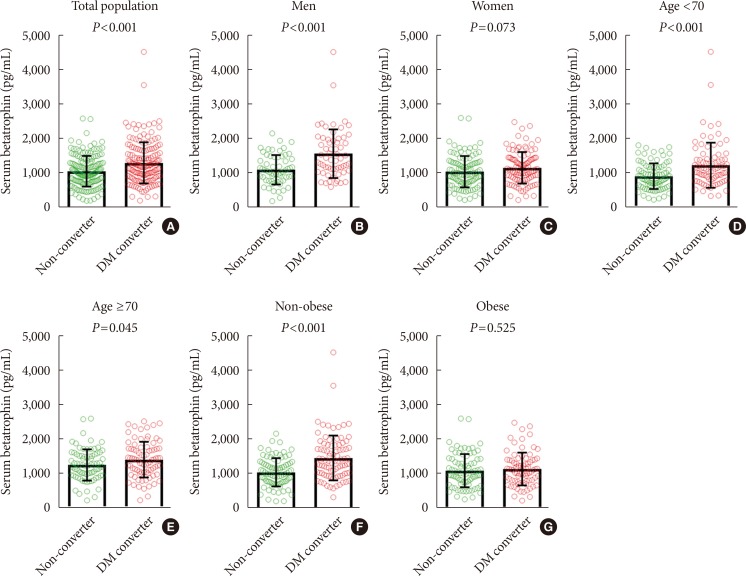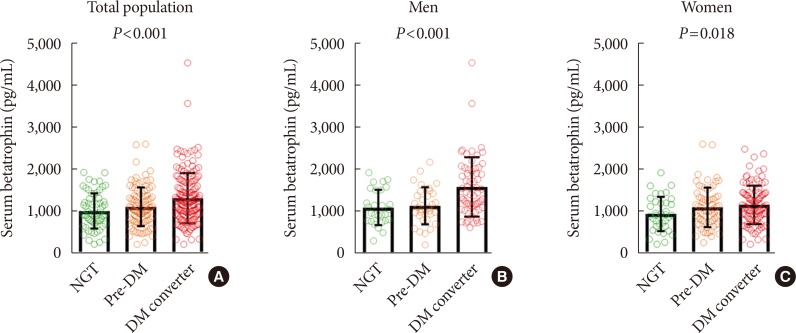Diabetes Metab J.
2018 Feb;42(1):53-62. 10.4093/dmj.2018.42.1.53.
Serum Betatrophin Concentrations and the Risk of Incident Diabetes: A Nested Case-Control Study from Chungju Metabolic Disease Cohort
- Affiliations
-
- 1Division of Endocrinology and Metabolism, Department of Internal Medicine, Seoul St. Mary's Hospital, College of Medicine, The Catholic University of Korea, Seoul, Korea. yoonk@catholic.ac.kr
- 2Division of Endocrinology and Metabolism, Department of Internal Medicine, Yeouido St. Mary's Hospital, College of Medicine, The Catholic University of Korea, Seoul, Korea.
- 3Epidemiology Branch, National Institute of Environmental Health Sciences, National Institutes of Health, Research Triangle Park, NC, USA.
- 4Department of Medical Informatics, College of Medicine, The Catholic University of Korea, Seoul, Korea.
- KMID: 2409186
- DOI: http://doi.org/10.4093/dmj.2018.42.1.53
Abstract
- BACKGROUND
Betatrophin is a newly identified hormone derived from the liver and adipose tissue, which has been suggested to regulate glucose and lipid metabolism. Circulating levels of betatrophin are altered in various metabolic diseases, although the results are inconsistent. We aimed to examine whether betatrophin is a useful biomarker in predicting the development of diabetes.
METHODS
A nested case-control study was performed using a prospective Chungju Metabolic disease Cohort Study. During a 4-year follow-up period, we analyzed 167 individuals who converted to diabetes and 167 non-converters, who were matched by age, sex, and body mass index. Serum betatrophin levels were measured by an ELISA (enzyme-linked immunosorbent assay).
RESULTS
Baseline serum betatrophin levels were significantly higher in the converter group compared to the non-converter group (1,315±598 pg/mL vs. 1,072±446 pg/mL, P < 0.001). After adjusting for age, sex, body mass index, fasting plasma glucose, systolic blood pressure, total cholesterol, and family history of diabetes, the risk of developing diabetes showed a stepwise increase across the betatrophin quartile groups. Subjects in the highest baseline quartile of betatrophin levels had more than a threefold higher risk of incident diabetes than the subjects in the lowest quartile (relative risk, 3.275; 95% confidence interval, 1.574 to 6.814; P=0.010). However, no significant relationships were observed between serum betatrophin levels and indices of insulin resistance or β-cell function.
CONCLUSION
Circulating levels of betatrophin could be a potential biomarker for predicting new-onset diabetes. Further studies are needed to understand the underlying mechanism of this association.
Keyword
MeSH Terms
Figure
Reference
-
1. Koo BK, Moon MK. Are we in the same risk of diabetes mellitus? Gender- and age-specific epidemiology of diabetes in 2001 to 2014 in the Korean population. Diabetes Metab J. 2016; 40:175–181. PMID: 27273907.
Article2. Chen L, Magliano DJ, Zimmet PZ. The worldwide epidemiology of type 2 diabetes mellitus: present and future perspectives. Nat Rev Endocrinol. 2011; 8:228–236. PMID: 22064493.3. Tabak AG, Herder C, Rathmann W, Brunner EJ, Kivimaki M. Prediabetes: a high-risk state for diabetes development. Lancet. 2012; 379:2279–2290. PMID: 22683128.4. Herder C, Kowall B, Tabak AG, Rathmann W. The potential of novel biomarkers to improve risk prediction of type 2 diabetes. Diabetologia. 2014; 57:16–29. PMID: 24078135.
Article5. Echouffo-Tcheugui JB, Dieffenbach SD, Kengne AP. Added value of novel circulating and genetic biomarkers in type 2 diabetes prediction: a systematic review. Diabetes Res Clin Pract. 2013; 101:255–269. PMID: 23647943.
Article6. Cho JH, Kim JW, Shin JA, Shin J, Yoon KH. β-Cell mass in people with type 2 diabetes. J Diabetes Investig. 2011; 2:6–17.7. Shirakawa J, De Jesus DF, Kulkarni RN. Exploring inter-organ crosstalk to uncover mechanisms that regulate β-cell function and mass. Eur J Clin Nutr. 2017; 71:896–903. PMID: 28294170.
Article8. El Ouaamari A, Kawamori D, Dirice E, Liew CW, Shadrach JL, Hu J, Katsuta H, Hollister-Lock J, Qian WJ, Wagers AJ, Kulkarni RN. Liver-derived systemic factors drive β cell hyperplasia in insulin-resistant states. Cell Rep. 2013; 3:401–410. PMID: 23375376.9. Yi P, Park JS, Melton DA. Betatrophin: a hormone that controls pancreatic β cell proliferation. Cell. 2013; 153:747–758. PMID: 23623304.10. Espes D, Lau J, Carlsson PO. Increased circulating levels of betatrophin in individuals with long-standing type 1 diabetes. Diabetologia. 2014; 57:50–53. PMID: 24078058.
Article11. Espes D, Martinell M, Carlsson PO. Increased circulating betatrophin concentrations in patients with type 2 diabetes. Int J Endocrinol. 2014; 2014:323407. PMID: 24963292.
Article12. Fenzl A, Itariu BK, Kosi L, Fritzer-Szekeres M, Kautzky-Willer A, Stulnig TM, Kiefer FW. Circulating betatrophin correlates with atherogenic lipid profiles but not with glucose and insulin levels in insulin-resistant individuals. Diabetologia. 2014; 57:1204–1208. PMID: 24623100.
Article13. Fu Z, Berhane F, Fite A, Seyoum B, Abou-Samra AB, Zhang R. Elevated circulating lipasin/betatrophin in human type 2 diabetes and obesity. Sci Rep. 2014; 4:5013. PMID: 24852694.
Article14. Gomez-Ambrosi J, Pascual E, Catalan V, Rodriguez A, Ramirez B, Silva C, Gil MJ, Salvador J, Fruhbeck G. Circulating betatrophin concentrations are decreased in human obesity and type 2 diabetes. J Clin Endocrinol Metab. 2014; 99:E2004–E2009. PMID: 25050901.15. Hu H, Sun W, Yu S, Hong X, Qian W, Tang B, Wang D, Yang L, Wang J, Mao C, Zhou L, Yuan G. Increased circulating levels of betatrophin in newly diagnosed type 2 diabetic patients. Diabetes Care. 2014; 37:2718–2722. PMID: 25024395.
Article16. Abu-Farha M, Abubaker J, Al-Khairi I, Cherian P, Noronha F, Hu FB, Behbehani K, Elkum N. Higher plasma betatrophin/ANGPTL8 level in type 2 diabetes subjects does not correlate with blood glucose or insulin resistance. Sci Rep. 2015; 5:10949. PMID: 26077345.
Article17. Chen X, Lu P, He W, Zhang J, Liu L, Yang Y, Liu Z, Xie J, Shao S, Du T, Su X, Zhou X, Hu S, Yuan G, Zhang M, Zhang H, Liu L, Wang D, Yu X. Circulating betatrophin levels are increased in patients with type 2 diabetes and associated with insulin resistance. J Clin Endocrinol Metab. 2015; 100:E96–E100. PMID: 25303484.
Article18. Gao T, Jin K, Chen P, Jin H, Yang L, Xie X, Yang M, Hu C, Yu X. Circulating betatrophin correlates with triglycerides and postprandial glucose among different glucose tolerance statuses: a case-control study. PLoS One. 2015; 10:e0133640. PMID: 26247824.19. Guo K, Lu J, Yu H, Zhao F, Pan P, Zhang L, Chen H, Bao Y, Jia W. Serum betatrophin concentrations are significantly increased in overweight but not in obese or type 2 diabetic individuals. Obesity (Silver Spring). 2015; 23:793–797. PMID: 25776943.
Article20. Tokumoto S, Hamamoto Y, Fujimoto K, Yamaguchi E, Okamura E, Honjo S, Ikeda H, Wada Y, Hamasaki A, Koshiyama H. Correlation of circulating betatrophin concentrations with insulin secretion capacity, evaluated by glucagon stimulation tests. Diabet Med. 2015; 32:653–656. PMID: 25655786.
Article21. Yamada H, Saito T, Aoki A, Asano T, Yoshida M, Ikoma A, Kusaka I, Toyoshima H, Kakei M, Ishikawa SE. Circulating betatrophin is elevated in patients with type 1 and type 2 diabetes. Endocr J. 2015; 62:417–421. PMID: 25753914.
Article22. Yi M, Chen RP, Yang R, Guo XF, Zhang JC, Chen H. Betatrophin acts as a diagnostic biomarker in type 2 diabetes mellitus and is negatively associated with HDL-cholesterol. Int J Endocrinol. 2015; 2015:479157. PMID: 26819617.
Article23. Abu-Farha M, Sriraman D, Cherian P, AlKhairi I, Elkum N, Behbehani K, Abubaker J. Circulating ANGPTL8/betatrophin is increased in obesity and reduced after exercise training. PLoS One. 2016; 11:e0147367. PMID: 26784326.
Article24. Al-Daghri NM, Rahman S, Sabico S, Amer OE, Wani K, Ansari MG, Al-Attas OS, Kumar S, Alokail MS. Circulating betatrophin in healthy control and type 2 diabetic subjects and its association with metabolic parameters. J Diabetes Complications. 2016; 30:1321–1325. PMID: 27311786.
Article25. Chen CC, Susanto H, Chuang WH, Liu TY, Wang CH. Higher serum betatrophin level in type 2 diabetes subjects is associated with urinary albumin excretion and renal function. Cardiovasc Diabetol. 2016; 15:3. PMID: 26739836.
Article26. Gomez-Ambrosi J, Pascual-Corrales E, Catalan V, Rodriguez A, Ramirez B, Romero S, Vila N, Ibanez P, Margall MA, Silva C, Gil MJ, Salvador J, Fruhbeck G. Altered concentrations in dyslipidemia evidence a role for ANGPTL8/betatrophin in lipid metabolism in humans. J Clin Endocrinol Metab. 2016; 101:3803–3811. PMID: 27472196.27. Wang H, Lai Y, Han C, Liu A, Fan C, Wang H, Zhang H, Ding S, Teng W, Shan Z. The effects of serum ANGPTL8/betatrophin on the risk of developing the metabolic syndrome: a prospective study. Sci Rep. 2016; 6:28431. PMID: 27345212.
Article28. Yue S, Wu J, Zhang J, Liu L, Chen L. The relationship between betatrophin levels in blood and T2DM: a systematic review and meta-analysis. Dis Markers. 2016; 2016:9391837. PMID: 27242389.
Article29. Lee SH, Rhee M, Yang HK, Ha HS, Lee JH, Kwon HS, Park YM, Yim HW, Kang MI, Lee WC, Son HY, Yoon KH. Serum preadipocyte factor 1 concentrations and risk of developing diabetes: a nested case-control study. Diabet Med. 2016; 33:631–638. PMID: 26220259.
Article30. Lee SH, Yang HK, Ha HS, Lee JH, Kwon HS, Park YM, Yim HW, Kang MI, Lee WC, Son HY, Yoon KH. Changes in metabolic health status over time and risk of developing type 2 diabetes: a prospective cohort study. Medicine (Baltimore). 2015; 94:e1705. PMID: 26448024.31. Wang Y, Quagliarini F, Gusarova V, Gromada J, Valenzuela DM, Cohen JC, Hobbs HH. Mice lacking ANGPTL8 (Betatrophin) manifest disrupted triglyceride metabolism without impaired glucose homeostasis. Proc Natl Acad Sci U S A. 2013; 110:16109–16114. PMID: 24043787.
Article32. Gusarova V, Alexa CA, Na E, Stevis PE, Xin Y, Bonner-Weir S, Cohen JC, Hobbs HH, Murphy AJ, Yancopoulos GD, Gromada J. ANGPTL8/betatrophin does not control pancreatic beta cell expansion. Cell. 2014; 159:691–696. PMID: 25417115.
Article33. Jiao Y, Le Lay J, Yu M, Naji A, Kaestner KH. Elevated mouse hepatic betatrophin expression does not increase human β-cell replication in the transplant setting. Diabetes. 2014; 63:1283–1288. PMID: 24353178.
Article34. Cox AR, Lam CJ, Bonnyman CW, Chavez J, Rios JS, Kushner JA. Angiopoietin-like protein 8 (ANGPTL8)/betatrophin overexpression does not increase beta cell proliferation in mice. Diabetologia. 2015; 58:1523–1531. PMID: 25917759.
Article35. Sun LL, Liu TJ, Li L, Tang W, Zou JJ, Chen XF, Zheng JY, Jiang BG, Shi YQ. Transplantation of betatrophin-expressing adipose-derived mesenchymal stem cells induces β-cell proliferation in diabetic mice. Int J Mol Med. 2017; 39:936–948. PMID: 28290605.
Article36. Li S, Liu D, Li L, Li Y, Li Q, An Z, Sun X, Tian H. Circulating betatrophin in patients with type 2 diabetes: a meta-analysis. J Diabetes Res. 2016; 2016:6194750. PMID: 26697500.
Article37. Abu-Farha M, Abubaker J, Al-Khairi I, Cherian P, Noronha F, Kavalakatt S, Khadir A, Behbehani K, Alarouj M, Bennakhi A, Elkum N. Circulating angiopoietin-like protein 8 (betatrophin) association with HsCRP and metabolic syndrome. Cardiovasc Diabetol. 2016; 15:25. PMID: 26850725.
Article38. Lee YH, Lee SG, Lee CJ, Kim SH, Song YM, Yoon MR, Jeon BH, Lee JH, Lee BW, Kang ES, Lee HC, Cha BS. Association between betatrophin/ANGPTL8 and non-alcoholic fatty liver disease: animal and human studies. Sci Rep. 2016; 6:24013. PMID: 27045862.
Article
- Full Text Links
- Actions
-
Cited
- CITED
-
- Close
- Share
- Similar articles
-
- Circulating Betatrophin Levels Are Associated with the Lipid Profile in Type 2 Diabetes
- Investigation of Blood Betatrophin Levels in Obese Children with Non-Alcoholic Fatty Liver Disease
- Glucose-Dependent Insulinotropic Peptide Level Is Associated with the Development of Type 2 Diabetes Mellitus
- Follicular fluid cerebellin and betatrophin regulate the metabolic functions of growing follicles in polycystic ovary syndrome
- Fasting Serum Glucose Level and Gastric Cancer Risk in a Nested Case-control Study



